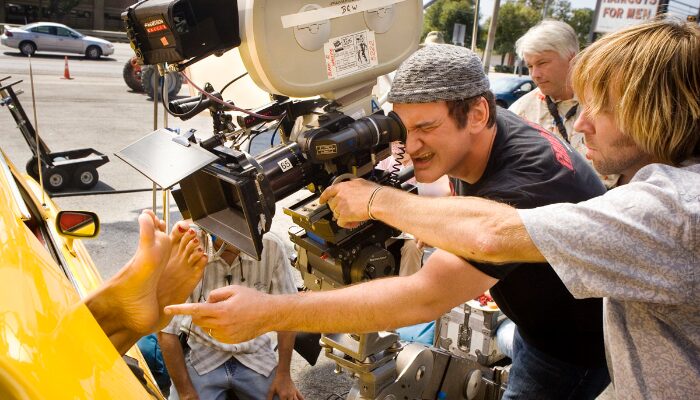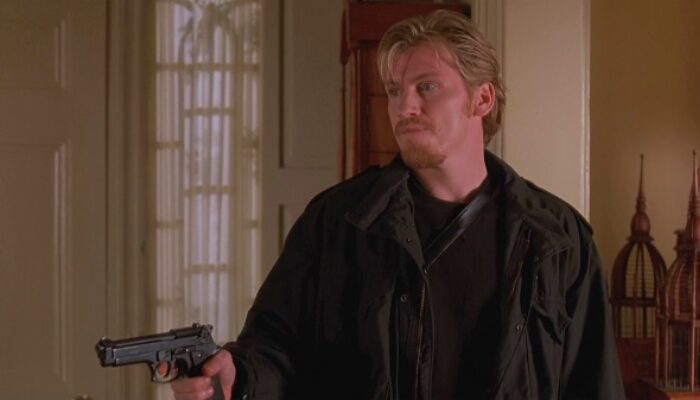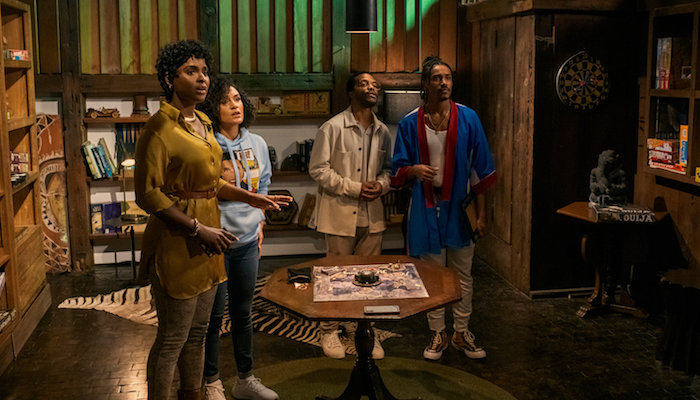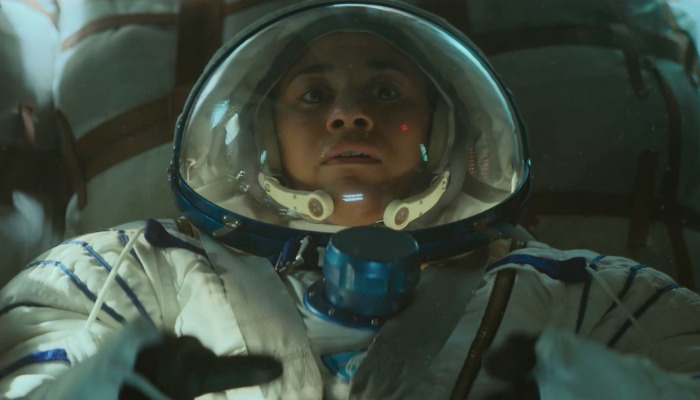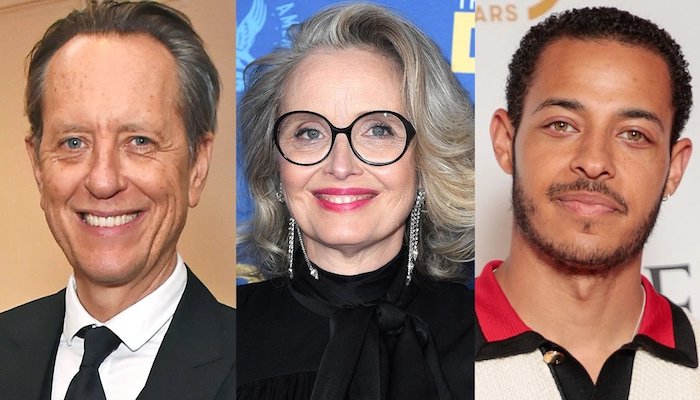Film Review: EQUALS: Broad Themes in a Focused Film [Tribeca 2016]
Equals Review
Equals (2016) Film Review from the 15th Annual Tribeca Film Festival, a movie directed by Drake Doremus, starring Nicholas Hoult, Kristen Stewart, Guy Pearce, Jacki Weaver, Bel Powley, Claudia Kim, Kate Lyn Sheil, David Selby, Toby Huss, Aurora Perrineau, Scott Lawrence, Rebecca Hazlewood, Rizwan Manji, and Kai Lennox.
Equals presented us with a setting that was entirely familiar, in most every respect. This film was a Dystopian tale of forced conformity, an informant culture, and the vices of determined self-awareness – versus the virtue of dedicated self-denial – to any given society. It was, however, unique in one respect. It was straightforward with its presented main protagonists, Silas (Nicholas Hoult) & Nia (Kristen Stewart), as products of, victims of, and resistors to a controlled society.
Allegories – about forbidden fruit, or Feline curiosity – are always for our own sake; and in the case of productive types, like Silas & Nia, sometimes all it takes, to become a slipped cog, is the realization that something was missing. Once that notion sets in, it becomes viral. The virulent nature of a natural notion, however, was where Equals staked its core conflict.
For any futurists/ techies in the audience, the initial reaction to the the film’s technical aspect would likely be the same: neat. Along with (or besides) its relatively questionable ideas (of how such a precarious population should live), came some pretty awesome tech solutions to everyday living (screw future necessity – I want my transforming studio apartment now). Neat, of course, was the whole point of this.
It may take near-extinction to put us all on the same page, regarding placing the needs of the many over the needs of the few; but it would take a great deal of comfort to keep us there. Comfort is how any civilization works, really. We adhered to laws so long as enough people subscribe to/ are invested in the status quo.
The difference between Utopia & Dystopia is determined by how the people within any social construct feel about it.
For everyone that believes we live in a golden age, today, there is at least one person who believes we have lost our way (if not our souls). From that standpoint, it should be just as easy to understand why every society is a Dystopian one to somebody; just as every society will have its vigilant defenders.
This brings me back to the matter of what it was, exactly, that the likes of Silas & Nia were missing, in the first place.
After recovering from an extinction-level event, at some point it was determined that the strictest population control was necessary for the remaining population to both survive & thrive. This, in turn, has meant curbing Human sexuality, itself. There’s still sex; but it is strictly procreative. The thing that’s been missing, therefore, was gender identity, and the sexual attraction/ passions that come with/ from it. The film made fallout to gender identity the thing that needed to be controlled, for the sake of the greater good of Humanity’s last remaining (‘civilized’) enclave: The Collective.
Since, at various points in time, this could have been the corrosive effects of science/ critical thinking, abolitionism, feminism, humanism, interracial relations – the list goes on – the question that needs to be asked, going into this film, is what would a Silas & Nia story look like in our present society, and one glaring example came to mind. In the film’s society, where everyone is expected to be the same, wouldn’t any sex be same-sex?
The universal appeal of classics like ‘1984,’ comes from how easily we can customize their conflicts to our times & circumstances. The same can be said for concepts like X-Men – where the ‘X’ might as well stand for ‘place your personal disenfranchisement here.’ Once it occurred to me that Gay & reproductive rights are the current state of the ongoing Culture Wars, any temptation to make unfair genre comparisons went out the window. Equals would remain a film squarely centered on two people finding themselves – in part through finding each other – with the genre aspects amounting to little more than an interchangeable backdrop.
The self-discovery aspect to the film made an issue of personal identity – always an issue within such stories. Once sexual attraction became the central plot element, however, it follows that gender identity was the more specific central theme. Declaring the natural as dangerous aberration, the stigmatizing of inherent natures, and what happens when an entire society is conditioned/ marshaled to those ends.
Equals then seemingly asks a simple question, befitting the narrow focus I had applied to it – how do you self-identify when personal identity is downplayed? More importantly, there was the question of how do you self-identify when you self-identify ‘wrong.’ I’ll even go one further (if not cruder): the question of how do you put the Genie back in the bottle, after it settles into living in your heart, working in your head, and spending all of its free time in your pants.
Just staying in the closet, and ‘therapy’ options (‘Pray Away the Gay,’ etc.), was the answer, for much of the film. Silas & Nia would discover a peer group, eventually, which quickly evolved into a resistance movement. Both of these elements were fronted by the reliable earnestness of Guy Pearce, and the nuanced austerity of Jacki Weaver. From that point on, the darker aspects of dealing with ‘corruptive societal elements’ were on display.
There will be viewers who will see the evils of communism as the takeaway from this film. Easy to do, considering how many similarly themed classics have done so. Easier still, considering the likely reaction to the term Collective. The Collective was no more communist, for micromanaging Human behavior, than the Vatican, historically. For that matter, you could throw in debates over things like Civil Rights, reproductive rights, or safety laws.
The Silas-Nia romance encapsulated the larger conflict within the Collective. This made it easy to single out the same-sex debate as the most pertinent example of State level behavioral control. Unfortunately, the film’s genre familiarity might make such a present issue easier for opponents of same-sex rights to ignore. In that regard, Equals may be self-defeating. On the other hand, I suppose it depends on where your focus falls, across the broader themes presented.
The film placed an emphasis on the sense of mutual discovery. The excitement to the newness of it all – amplified considerably by the taboo aspect – was well conveyed, for Silas & Nia’s more intimate moments. The tension generated by those moments, however, was more of a highlight than the release. It did manage to serve that release well, all the same. We should all have at least one such discovery moment memory to draw from. Moments to relate to, while watching theirs unfold – and their efforts to keep what they had found.
This may seem critical, but Kristen Stewart’s near signature brand of blasé bland lent itself perfectly to the role. I won’t go so far as to say she was born for the role. It was, however, one of her more comfortable looking performances.
In the event her comfort wasn’t enough, Nicholas Hoult brought enough undercurrent passion to the role for both of them. That was just as well. Silas spent much of the film coming to grips with his passion, while Nia spent that time suppressing hers. Hoult kept the passion flowing even after Silas supposedly got better. There was a pained recognition to Silas’ new state as a source of distress for Nia. That performance accounted for an unevenness to their dynamic, that actually sort of worked for its outcome.
As telegraphed as the climactic twists were (doing what comes naturally comes with built-in risks, naturally; the fifth wheel is always a liability; and the Romeo & Juliet angle often writes itself), we were at least left with a sense of loss, given how much the relevant character had invested in the pursuit, and how much the actor had invested in the character. That loss, in turn, gave some credence to the film’s resolution. You can’t fight the system; only inspire it to change. Failing that, your only recourse is the Eternal Sunshine of a Spotless Mind. That, or people, places, and things that wouldn’t care about something as personal as natural attraction.
I would have liked to see how the other half lived, regarding the only other enclave mentioned. Still, I could see how it might’ve been besides the point. Any society would stoop to downplaying the appeal of a rival – accounting for the specious details presented. Between that, and its eventual role as an only recourse, it remained an ideal. A focal point to the very idea of escapism, from whatever controlled environment the viewer could think of. Time was, ‘alternative’ kids, growing up in any given small town/ village, would dream of moving to cosmopolitan big cities. New York, San Francisco, Paris – places where they could actually blend in & be themselves.
Online Social Media has made things easier, since, and I suppose that element was present in the film, as well (certainly, Silas & Nia’s access to information, about the other enclave, helped to make it an idealized option); but the inherent uncertainty behind any ideal, upon realization, made the open-endedness of the film’s resolution more effective.
Ever wondered what a star-crossed Romulan-Vulcan road-trip would be like? Considering that much more than tolerance awaits any given Alt-Country Mouse, on the way to the city, that question, alone, kept me interested in Silas & Nia’s story, beyond the film’s conclusion.
I have my doubts whether Equals will appeal to a wider YA audience. Yes, the “my love is the most important thing in the history of everything” theme is a young adult hallmark. Without the blazing backdrops of the Divergent, or Hunger Games series, however, I imagine Equals just wouldn’t resonate with the same intensity. I do think that there may be enough to it for some cult appreciation. Despite similarities to The Matrix, Equilibrium did manage to carve out a small place for itself, within the genre.
If we must make genre comparisons, then there were a few complimentary examples. Not the least of which: the question of how would you chose to live your final moments, from Blade Runner.
Like Blade Runner, Equals benefited from the good use of visuals (some frankly stunning vistas, bringing some aesthetic pleasance to the sterility of the setting), and an evocative score, to help carry (telegraph, in certain cases) the narrative.
I am not sure that I saw the same film everyone else did (or will). I did, however, like the film that I think I saw.
Rating: 6/10
Leave your thoughts on this Equals review and this film below in the comments section. Readers seeking more film reviews can visit our Movie Review Page, our Movie Review Facebook Page, and our Movie Review Google+ Page. Want up-to-the-minute notifications? FilmBook staff members publish articles by Email, Twitter, Tumblr, Google+, and Facebook.
Related Articles
FilmBook's Newsletter
Subscribe to FilmBook’s Daily Newsletter for the latest news!


